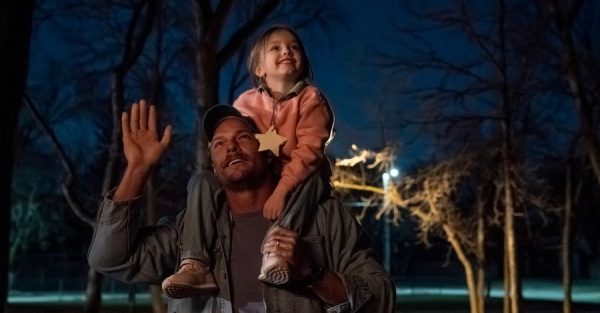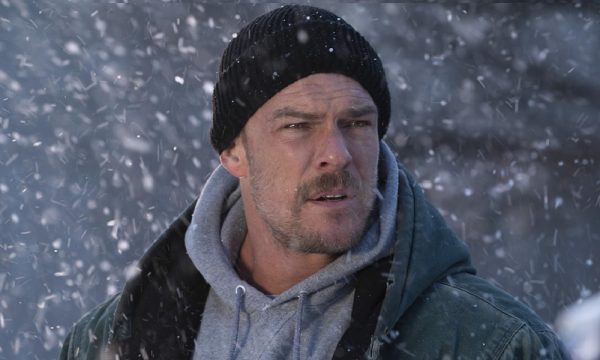Ordinary Angels, 2024.
Directed by Jon Gunn.
Starring Hilary Swank, Alan Ritchson, Emily Mitchell, Skywalker Hughes, Nancy Travis, Tamala Jones, Drew Powell, Amy Acker, Stephanie Sy, Erik Athavale, Nancy Sorel, Dempsey Bryk, David Lawrence Brown, Ryan Allen, Andrea del Campo, and Gabriel Daniels.
SYNOPSIS:
Inspired by the incredible true story of a hairdresser who single-handedly rallies an entire community to help a widowed father save the life of his critically ill young daughter.
Apparently, in Ordinary Angels, the refusal to take no for an answer is a superpower. Set in 1994 in Louisville and inspired by a true story, alcoholic hairdresser Sharon Stevens (Hilary Swank, playing the character as if she is a tornado walking into every room), searching for a new purpose in life, decides to dedicate every waking moment to ensuring that exhausted, financially struggling, blue-collar widower Ed Schmitt (a vulnerable, moving Alan Ritchson determined to try making the film work against all odds) wipes away his debt and secures airborne transportation for his terminally ill five-year-old daughter Michelle (Emily Mitchell) to a specialty children’s hospital for a liver transplant when a replacement is secured.
To an extent, director Jon Gunn (working from a screenplay collaboration by Meg Tilly and Kelly Fremon Craig, the latter incredibly gifted at finding the humanity and authenticity in characters and situations, which is something that occasionally is on display here but is mostly traded for with syrupy, emotionally manipulative exaggerated melodrama direction) is aware that Michelle isn’t just an alcoholic, but has an addictive personality, and has approached helping this family with that same behavior.
Sharon continuously crosses Ed’s personal boundaries, who mostly has to sit back and let it happen because, with shocking ease, she can get things done that make his living nightmare easier to manage. $400,000 of medical bills need to be paid? All of it is cleared and forgiven after one conversation eliciting sympathy from the appropriate parties. At one point, she literally tells him, “I don’t take no for an answer,” which is supposed to be perceived as saintly due to her angelic intentions. Instead, it’s awkward, as we feel for Ed whenever he is put into an uneasy position to express gratitude and thanks to this well-meaning crazy lady. The film is too quick to paint her as a miracle worker without interrogating her methods, primarily because what Jon Gunn (and the assortment of executive producers attached known for projects like these) all see is divine intervention and an opportunity to prevent the story as such.
That’s not to say that there aren’t scenes making clear that Sharon has burned some bridges and failed at raising her own son, now a talented musician who wants nothing to do with her. In a scathing piece of dialogue, he tells her that he feels bad for this young girl for now having to rely on his mom (a cutting exchange most likely written by Kelly Fremon Craig.) For a moment, it feels as if the film might go somewhere with developing these characters and finding some change within them.
However, Ordinary Angels is mostly concerned with emphasizing an admittedly powerful story of community in its third act. The film, in a baffling ending credits move, goes out of its way to show that much of it was cheaply manufactured drama for tears. These filmmakers are lucky to have Alan Ritchson, believably selling the fatigue of the situation, already having lost his wife to an illness and now ready to take on dangerous roofing work in rough weather to make ends meet, someone desperately wanting to save his daughter but whom might not necessarily believe in himself (and no longer cares about God.)
All Michelle, the one suffering from this condition attacking her liver, is given to do is to generally say something cutesy whenever she is feeling healthy enough to talk. This is doubly frustrating considering there is a moment at Christmastime with her slightly older sister that is sincerely touching, making one wish that bond was given a stronger focus. The fact that the focus of this film is not entirely on the family, to begin with, is a severe miscalculation.
There is no question that Sharon’s bulldozing, anything-is-possible mentality affects Ed, but it’s taken in a misguided narrative direction where the last 30 minutes are spent watching him navigate a blizzard with roads shut down, attempting to get his daughter to an airport where a private plane is going to fly them to a hospital. To turn all of this into an overblown race against time feels disrespectful to everyone involved; there is no nuance to the characters or storytelling here. There are intriguing, insightful things to say however, about addictive personalities or to explore with the juxtaposition of saving a liver vs. killing a liver, which is mostly dropped for melodrama. Ordinary Angels tries so hard to be extraordinary that it loses what makes this story powerful and earnestly inspiring.
Flickering Myth Rating – Film: ★ ★ / Movie: ★ ★ ★
Robert Kojder is a member of the Chicago Film Critics Association and the Critics Choice Association. He is also the Flickering Myth Reviews Editor. Check here for new reviews, follow my Twitter or Letterboxd, or email me at MetalGearSolid719@gmail.com















